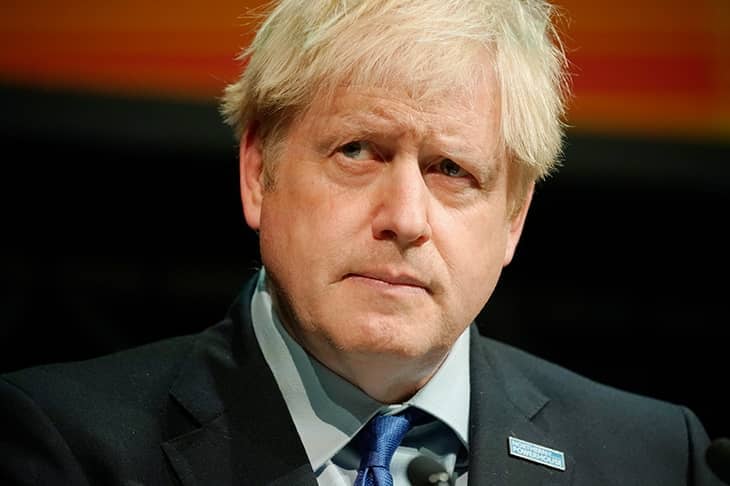Tory MPs only have one topic of conversation: the fate of Boris Johnson. They huddle together in offices in Portcullis House, comparing notes, assessing the Prime Minister’s survival prospects. At the time of writing, there is a sense in Westminster that attempts to oust Johnson have been delayed; that the danger for him will flare up again after the police end their investigation into Downing Street parties or after the local elections in May. But Johnson is not being helped by the fact that many of the hints of favour or policy change he has dropped to MPs as he has tried to shore up his position have not come to much. This is causing irritation and making MPs more inclined to send in no-confidence letters.
One of the few Tories influential enough to have a material effect on how his fellow MPs will act argues that waiting is the best option for the party. He does not think Johnson should lead the Tories into the next election, yet he believes that MPs should hold off submitting letters of no-confidence either until after the full Gray report is published or after defeats in the local elections. The wait, he argues, would ensure the greatest chances of consensus in both the parliamentary and the voluntary party about the need for a change of leader.
He is not the only Tory to think this way. One 2019 MP says he’s decided Johnson should go, but his association doesn’t agree. So he will wait until after the local election results before he tells them he has made up his mind and sends his letter in.

Not all of those who want to remove Johnson think it’s sensible to delay. They point out that the Labour MPs who wanted to topple Gordon Brown kept waiting for the ideal moment to act, only to find that they had run out of time and they were being led by him into a general election campaign. Their other great worry is that this is currently a story specifically about Boris Johnson, so in the eyes of the public it isn’t yet analogous to the sleaze scandals in the 1990s, which damaged the entire party — but this could change if the partygate story drags on.
In the meantime, the government is trying to show that it is getting on with things — which is not easy considering how distracted No. 10 aides and civil servants are by this whole business and by the prospect of a staff clear-out soon. It doesn’t help that Boris is trying to run everything from No. 10.
‘Levelling up’ is meant to be the defining mission of this government. The levelling-up white paper, a document which has been delayed more times than the Gray report, finally came out on Wednesday, but it cannot bear the weight of providing a policy prospectus for the Johnson government.
Levelling up has two problems from a political perspective. The first is that it will not be quick. The 12 national missions set out in the government paper are all pegged to 2030, rather than the next general election. (The timing problem has been worsened by the fact it has taken two years to get this white paper out.) The second is that it is hard to point to a country which has succeeded in systemically reducing regional inequalities. Michael Gove, the secretary of state for levelling up, keeps drawing comparisons with Renaissance Florence and the ‘Medici model’, which only highlights how few successful contemporary examples there are. After the fall of the Berlin wall, the German government spent two trillion euros on trying to reduce the differences between East and West Germany. This had some success. But even with this monumental level of spending (and the UK is contemplating nothing like this), the population of the old East Germany is smaller today than it was before reunification and East German households have only half the assets of West German ones.
Not all of those who want to remove Johnson think it’s sensible to delay
Given this, it is hard to imagine that the much more modest plans set out in the white paper will make a defining difference to this country. This is not to say there are no decent ideas in the document. The aim to help schools in deprived areas keep their best teachers is sensible, as is the plan to have more selective state sixth forms based on the Brampton Manor model (it last year sent more pupils to Oxbridge than Eton).
The plan to create more mayoralties, as well as to expand the powers of existing mayors, is welcome too. It is no coincidence that places with mayors — Teesside, the West Midlands and Manchester — feature more heavily in the national conversation and are better at attracting big projects.
Commendable as these ideas are, on their own they do not constitute a Tory agenda for the rest of this parliament. This is one of Johnson’s big problems. In 2019, it was clear that a vote for him was to break the Brexit deadlock in the Commons and stop Jeremy Corbyn from becoming prime minister. Both of those objectives were achieved. Then the pandemic dominated the government’s agenda for almost two years. Now that Covid seems to finally be in retreat it isn’t clear what Johnson’s purpose is, which will make him that much more vulnerable when his moment of reckoning comes.
The Tories’ concerns over parties have been exacerbated by a sense that Johnson’s administration is drifting and not doing enough to take advantage of the largest Conservative majority since Thatcher. The speed with which the government retreated over planning reform, its one major supply-side reform, was depressing. Without political capital or authority, it is hard to see how Johnson can now embark on any contested domestic reform agenda.
The number of letters being sent to the chairman of the 1922 remains a trickle, albeit a swelling one, not a flood. The worry for Johnson is that even if he does have until May, which is far from certain, it is becoming increasingly hard to see what will turn things around for him.







Comments